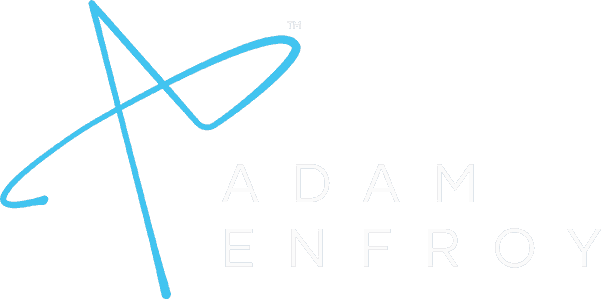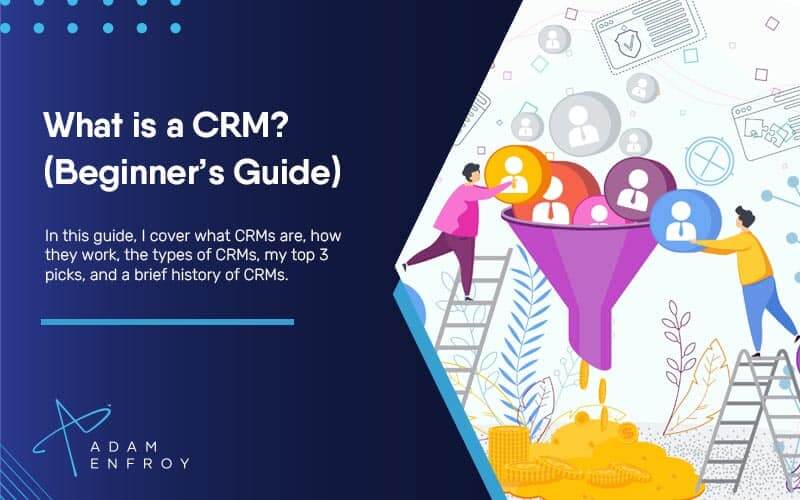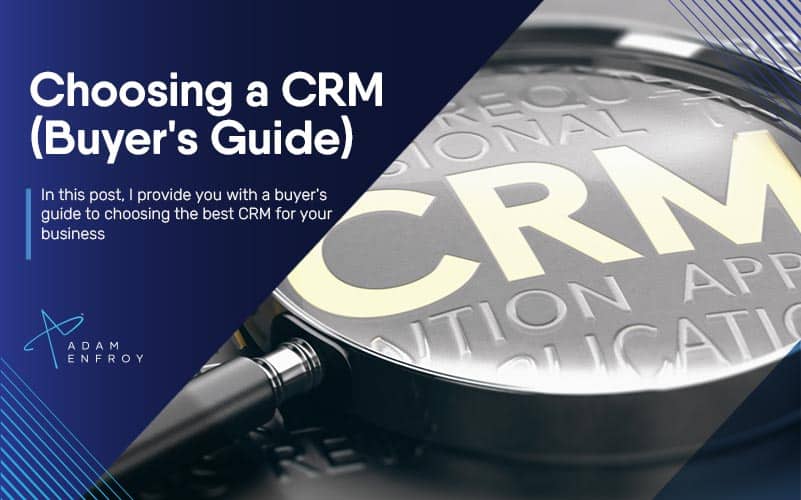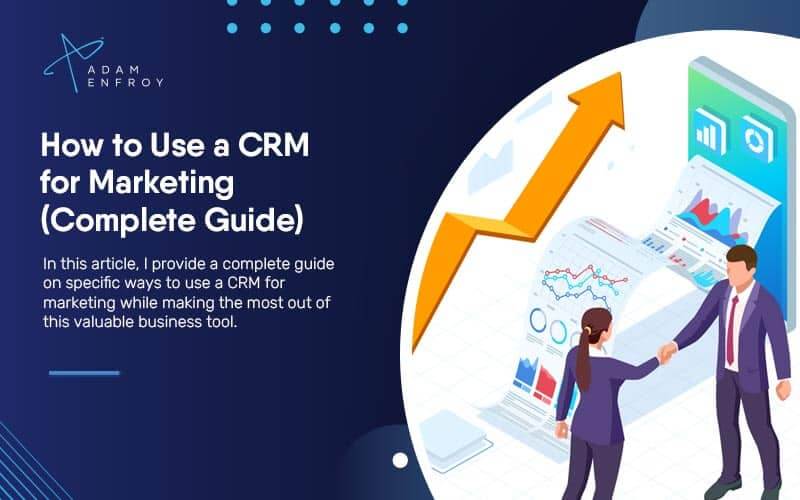17 Best CRM Software of 2024 (Compared and Reviewed)
Choosing the right CRM software is vital to maximizing sales and building customer relationships. From collecting lead information to tracking interactions and managing customer data, the best CRM software can help you meet your goals. In this guide, I ranked and reviewed the 17 best tools, along with my top 5 choices, so you can pick the best one.
Our experts tested over 30 CRM tools. On staff we have ex C-level executives, VPs of sales teams, web developers, sales managers, marketing directors, and people with over 50 years of combined experience using this type of software.
Read on.
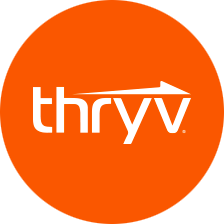
Thryv
Thryv is a great CRM for small businesses like realtors, financial firms, and any local business.
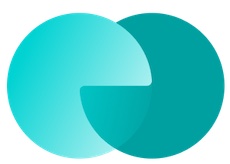
Monday
Customize your workflows and project management to track all aspects of the sales cycle, from lead gen to post-sale support.
We’re reader-supported. When you buy through links on our site, we may earn an affiliate commission.
In an industry where 72% of companies use CRM to build better customer relationships and track interactions, the right CRM software will pay off.
Customer relationship management (CRM) software aims to nurture these customer relationships across your channels, ensuring an excellent customer journey and experience and ultimately guiding customers down the sales funnel.
CRM tools help manage and improve company interaction within a centralized database by leveraging email marketing, lead generation, and marketing automation.
What is CRM Software?
Customer relationship management (CRM) software is an online tool that helps organizations manage a sales pipeline from lead generation to closing sales.
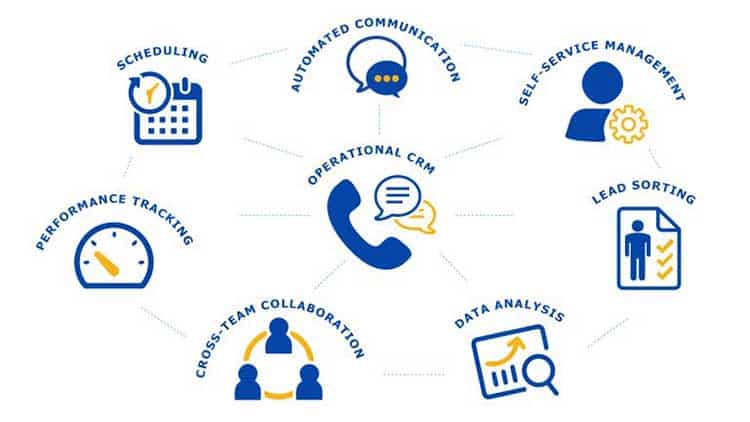
CRMs help companies access, organize, and make sense of customer data to generate more sales.
CRM collects information from various channels like social media, email campaigns, live chat, phone calls, personal interaction, feedback forms, and more.
It further leverages data analytics to analyze the customer’s buying history, patterns, and needs.
The aim is to enhance the customer experience and satisfaction, turning leads into customers and then nurturing and upselling that relationship.
CRM has been around for a long time (earlier in paper form), but the benefits of customer relationship management systems became apparent after widespread digitalization.
CRM systems link various departments, including sales, marketing, HR, customer service, IT, business intelligence (BI), and finance.
Furthermore, data is readily accessible by any employee in real time, which empowers teams to make quick, data-driven decisions.
CRM solutions have connected interdepartmental teams and increased sales while removing business silos.
What is the Best CRM Software?
After using a ton of different CRMs across numerous tech companies and testing both small business CRMs and enterprise CRMs, here are my top picks for the best CRM software.
1. Salesforce.
Best Enterprise CRM Software.
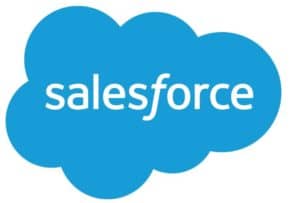
Adam’s Take
Do you want a selling tool that your team can use out of the box? Salesforce is my #1 recommendation for anything (and everything) CRM-related. If you want to get more leads, close more sales and build relationships with your audience, Salesforce gets my top recommendation.
Salesforce is one of the most famous names on this list and has more than a million users worldwide.
It’s a cloud-based CRM software that caters to all business branches, including sales, service, marketing, analytics, and more.
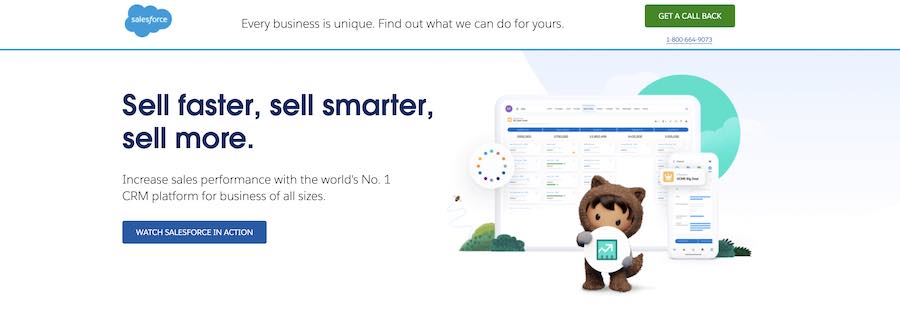
Key Features:
- Opportunity Management – You can close more deals by identifying the perfect opportunities with the ‘opportunity management’ module.
- Contact Management – With this module, you can track parameters like customer history, communications, and social media mentions.
- Sales Performance Management – Set sales goals and update targets for the best sales performance.
- Visual Workflow – You can drag, drop, share, and track files and updates using this.
- First Feed Feature – This feature lets you see what you want to see (based on your settings).
User Experience:
A visual dashboard gives you all the information and numbers you need to see at a glance while still providing the ability to dive deeply into the details with just a few clicks.
Salesforce’s interface is very user-friendly and easy to navigate.
The layout is clean and organized, making it simple to find what you’re looking for.
You can use various apps on tablets, mobile phones, and even smart watches, making it easy to stay connected to your data no matter where you are.
Pricing Plans:
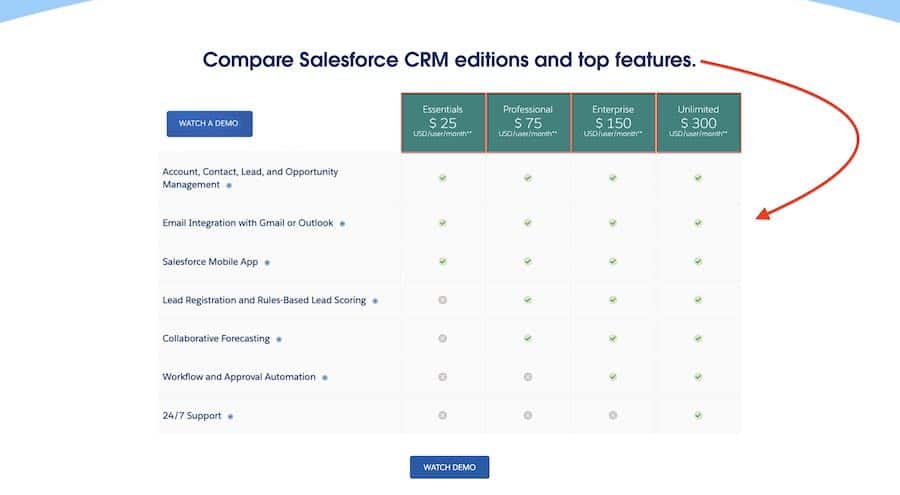
Salesforce offers a variety of products; therefore, the prices may vary. However, the subscription plans start at $25 per user per month, and the most expensive plan costs $1,250 per user per month (both billed annually). You can also get in touch with them for a customized plan.
What I Like/Dislike About Salesforce:
Like:
- 24/7 customer support is available via phone, email, and tickets.
- High-level automation and personalization (provide great social experience).
- 30-day free trial period.
- Cloud-hosted (faster and inexpensive).
- Compatible with Linux, Windows, Mac, and Android.
- Open API (therefore highly customizable).
- Offer enterprise territory sales management, a sales CRM, and management of social networks.
- Multi-language and multi-currency customer support.
- Wide range of email templates to choose from.
- In-built Einstein Lead Scoring.
- Lead management with sales force automation tools and business intelligence.
- Compatible with all devices, including mobile phones.
- Provides partner communities.
- In-built process builder and lead generation tools.
- Many third-party integrations (LeadExec, Ambassador, Zuora, and Zendesk, among others).
- Mass emailing option to help you save time and effort.
Dislike:
- Companies who want on-premise deployment can’t use this.
- Live chat support isn’t available.
Product Updates
- Appointment Bundling makes it easy to schedule multiple appointments with leads and contacts in a single day.
- More intelligent data and analytics mean you can trust your data more than ever and make confident decisions.
For a more detailed look at these top tools, check out my comparison of HubSpot vs. Salesforce.
Get started with Salesforce.
Save by Comparing CRM Software Quotes
2. Nutshell.
Best for Team Adoption.

Adam’s Take
Nutshell is a CRM that allows teams to access critical customer information quickly and easily. Whether it’s contact details, call notes or email conversations, Nutshell provides a single source of truth for every customer interaction.
Best For
Stress-Free Marketing
Price
$16+/mo
Annual Discount
Yes – Save 16%
Promotion
14-day trial
Nutshell automates your sales process, saving time on tasks and ensuring reps know what to do at every moment.
Nutshell’s easy-to-use reports give you insight into your business, so you can measure performance and pinpoint areas for improvement.
These reports provide valuable customer data, metrics, and trends, allowing you to make better-informed decisions on how best to move forward with your sales process.
Another great feature of Nutshell is its email templates and automated personal email sequences.
These features help you stay at the top of your buyers’ inboxes with a fraction of the effort.
Finally, Nutshell also offers simple web forms designed to collect leads directly from your website while tracking their effectiveness.
Whether you’re still building your site or you’ve had it up and running for a while, collecting leads is a key part of any successful website.
Key Features:
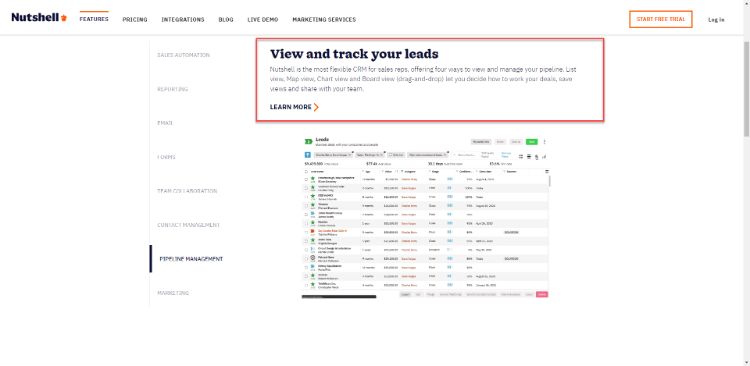
- Find every contact, customer, and conversation, no matter where they come from.
- Automate your sales process with automated pipelines and personalized email sequences.
- View and track your leads in one convenient place, so you can quickly see who’s responded or where they are in the sales cycle.
- Do all your email outreach from one tool – no need to switch between multiple apps.
- Report on your performance with easy-to-use information that will show you how well your sales process is doing.
- Sync up all of your lead data across multiple platforms for maximum efficiency
User Experience:
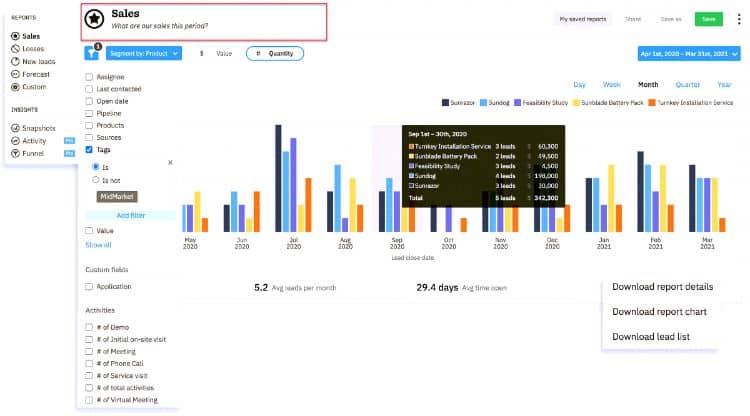
A personalized, quick start checklist when you sign up helps you get Nutshell up and running in no time.
The dashboard offers an easy-to-understand overview of your customer data, team performance, and sales process so you can stay on top of everything quickly and efficiently.
You can also meet with Nutshell’s CRM experts to ensure that you’re maximizing your platform use and getting the most value out of it.
Pricing Plans:
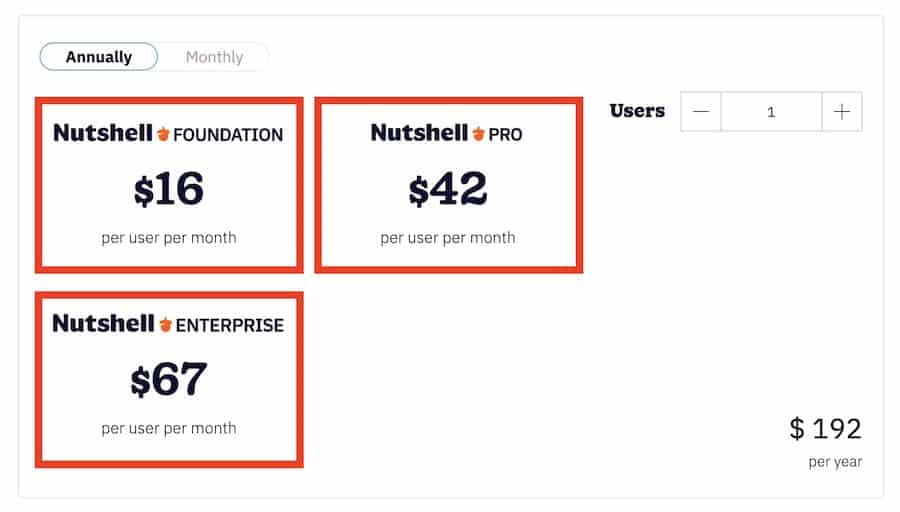
Nutshell offers these pricing plans:
- Nutshell Foundation: $16 per user per month
- Nutshell Pro: $42 per user per month
- Nutshell Enterprise: $67/month
The Limitless plan offers unlimited seats of Nutshell Pro.
There is also a 14-day free trial available to get you started.
What I Like/Dislike About Nutshell:
Like:
- Nutshell is laid out in a very user-friendly way
- It is easy to customize and tailor the platform to your specific needs
Dislike:
- The Nutshell UX on the iPhone could be improved to make it easier to use on smaller screens.
3. Monday.
Best CRM Workflows.

Adam’s Take
Want to get your hands on the best all around CRM? With custom sales pipelines created based on your specifications, the ability to set up workflows and make the best out of your data, and many other functions, I think that Monday.com is a great all around CRM system.
Best For
CRM Workflows
Price
$0/mo-$16/mo
Annual Discount
Yes – Save 18%
Promotion
Monday.com allows you to customize your workflows to track all the aspects of the sales cycle, from lead generation to post-sale support.
If you want to tailor anything related to your sales pipeline, workflow, or customer data, Monday.com is your best bet.
A complete view of your customers and sales data is accessible with Monday.com, and it’s an excellent choice for companies that want to monitor their sales process closely.
In addition, you can visualize everything at a glance with the Monday.com dashboard, making it easy to spot any potential bottlenecks or problems in your sales cycle.
Key Features:
- Have everything laid out in front of you so that you can quickly spot any potential problems in your sales cycle
- Easily customizable to track all aspects of the sales process
- Great for companies that want to monitor their sales pipeline and performance closely
- While on the go, you can also access Monday.com through its mobile app
- Integrate Monday.com with other apps and tools you use
Read more about Monday.com’s full CRM features.
User Experience:
Graphs, pie charts, bar charts, and tables display information quickly.
The interface is clean and straightforward, making it easy to find what you’re looking for.
You can also click on any element in the interface to get more information about it.
With the ability to know which salesperson is working on which deals, you can quickly assign tasks and follow up with customers.
Pricing:
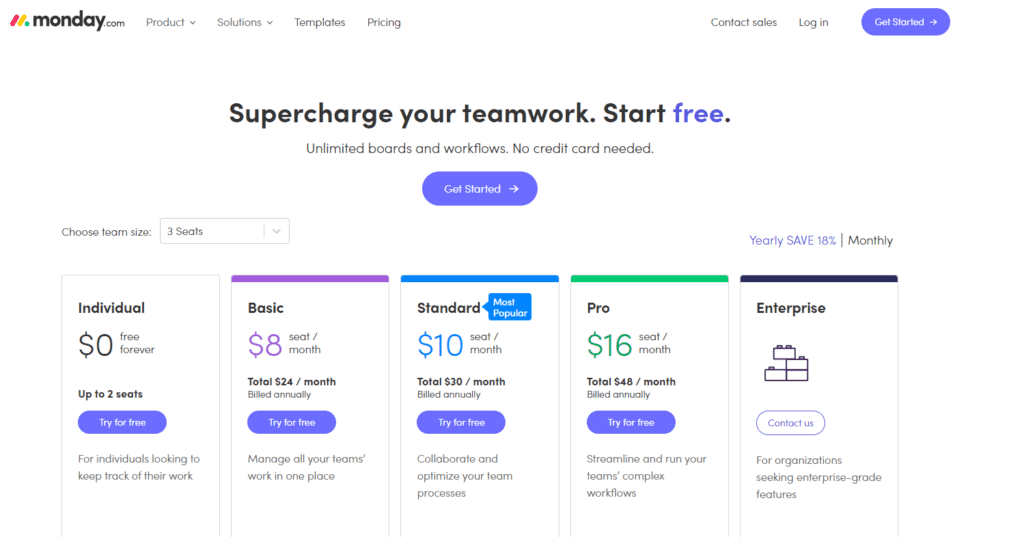
With a free 14-day trial, you can explore all of Monday.com’s features to see if they fit your company well.
After that, paid plans are as follows (for a team of three people minimum):
- Individual: $0 free forever
- Basic: $8 seat/month
- Standard: $10 seat/month
- Pro: $16 seat/month
- Enterprise: Contact them for a custom plan
What I Like/Dislike About Monday:
Like:
- You can use this platform to do everything from collecting user input to displaying it in a chart so that you can make decisions based on data.
- Collaborating with team members in real-time makes it easy to get work done quickly.
- Great at helping with job management and scheduling.
Dislike:
- Monday Work Docs’s search functionality is not as good as some of the other options on the market.
- With so much freedom, creating workflows is not as straightforward as it could be.
Product Updates:
- New customizable work forms allow you to gather information from your team more efficiently.
- With the Connect Boards Columns feature, you can now see even more data points at a glance.
- Using the new presentation mode, you can present your data in a way that is easy for others to understand.
4. Pipedrive.

Adam’s Take
Pipedrive is the best overall CRM software that I have found. With AI powering repetitive tasks and managing leads and sales, Pipedrive is a tool that is designed just right for salespeople.
Best For
Growing your revenue
Price
$14.90/mo-$99/mo
Annual Discount
Yes – Save 17%
Promotion
Pipedrive is a sales-focused CRM that uses AI to automate repetitive tasks and manage leads and sales. They currently support over 90,000 customers, and over $24 billion in deals have passed through their platform.
Key Features:
- Lead Management – Track leads and sales from forms, chatbots, and more on a 24/7 basis.
- Visual Sales Pipelines – You can organize your pipeline and create custom stages (hot, warm, cold) by rep or team member.
- Communication Tracking – A complete contact history tracks calls, emails, chats, and more, allowing you to set your schedule in real-time.
- Mobile Apps – You can use Pipedrive from your mobile device and integrate your smartphone with other sales apps to increase sales.
- Reports & Analytics – Get more insights with data-driven reports and dashboards.
User Experience:
Pipedrive is another excellent platform when it comes to user experience.
With dashboards that range from simple to complex, you can get as much or as little information as you want.
Look at your deals started, deals lost, activities, and even how much revenue you’ve generated, all in one place.
With an easy-to-understand left-hand side menu, you can also look at various reports that show you how your sales are doing.
Pricing:
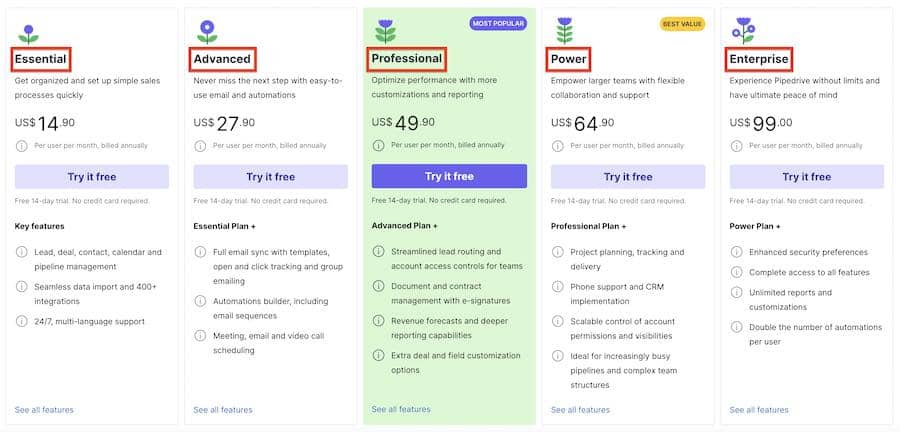
Pipedrive offers five paid plans: Essential, Advanced, Professional, Power, and Enterprise. These plans range from $14.90 per user per month to $99 per user per month.
What I Like/Dislike About Pipedrive:
Like:
- You can easily add deals, values, win probabilities, and close dates.
- Unlimited custom fields collect any piece of customer information.
- Custom reports can track revenue estimates and recurring revenue.
- Activity reports can track individual sales calls, emails, demos, and events.
- Lead source data reports tell you where your leads came from (organic, direct, SEM, social, outbound sales, etc.)
- “Sales Assistant” creates performance tips and automation recommendations to save time.
Dislike:
- Filters need more options to dive deep and get the data you need.
- With so many updates, the platform can sometimes feel a bit overwhelming.
- Product Updates
- No native dark mode means you might experience discomfort if you use the platform for long periods in low-light conditions.
Product Updates:
- New Leads Performance and Conversion reports show you how your leads are doing at each stage of the sales process.
- Scheduling Campaigns allow you to automatically add new deals, contacts, and activities based on certain criteria.
5. HubSpot CRM.
Best Free CRM with Marketing Tools.

Adam’s Take
Hubspot CRM is great for those that want to take their marketing and sales to the next level. It offers many features and allows you to track your performance over time. If you’re looking for a CRM that can help you close more deals and boost your productivity, Hubspot is worth considering.
HubSpot CRM is a full-featured marketing suite, with its CRM software being its most popular offering.
HubSpot CRM is great for sales professionals due to its features and time-saving tools. It’s also an option for marketing teams to capture, track, and grow new leads within a database.
They offer a 100% free version of their software, with the ability to upgrade and get access to their entire suite of marketing tools.
Key Features:
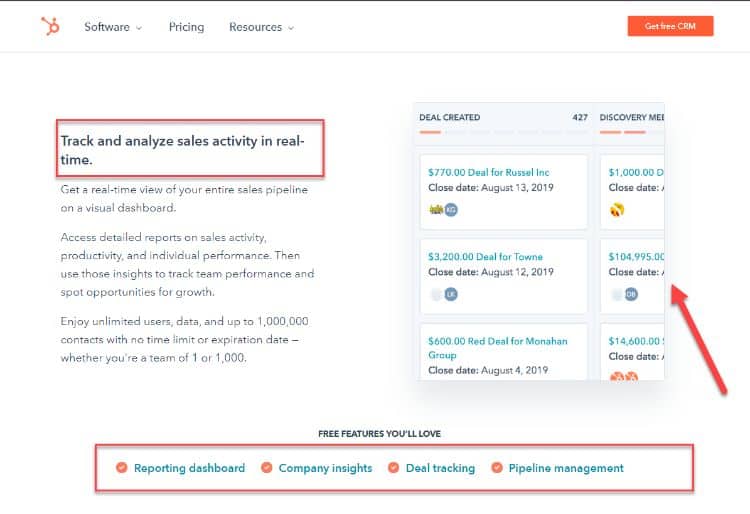
- Email and Lead Nurturing – You can send free, personalized emails and track your results with built-in analytics reports.
- Contact Organization and Management – You can connect your email inbox to their CRM and automatically sync and organize your contacts in one place.
- Over 300 Integrations – Easily connect your existing tech stack to get more functionality from the tools you’re already paying for.
- Live Chat and Chatbots – Help customers faster with support tickets, productivity tools, and instant chat capabilities.
- Sales Pipeline Data – Sales teams can view their entire pipeline with insights into sales activity and individual performance.
User Experience:
Understand where every lead is at using the visual pipeline and quickly add or update deals and contacts with just a few clicks.
It’s also easy to nurture your leads with personalized emails and move deals through your pipeline faster.
Pricing Plans:
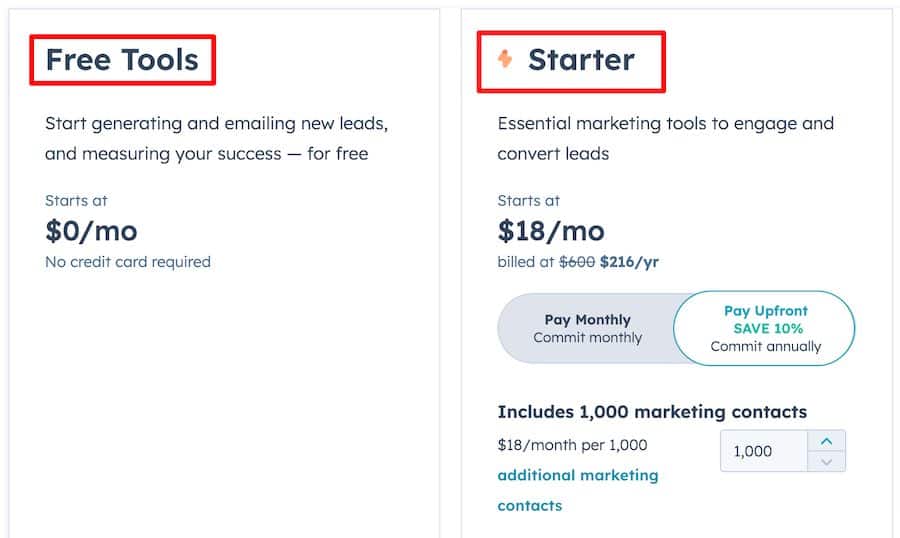
HubSpot CRM has a free plan that offers a lot of great features to start with. You can then choose to upgrade to one of their paid plans:
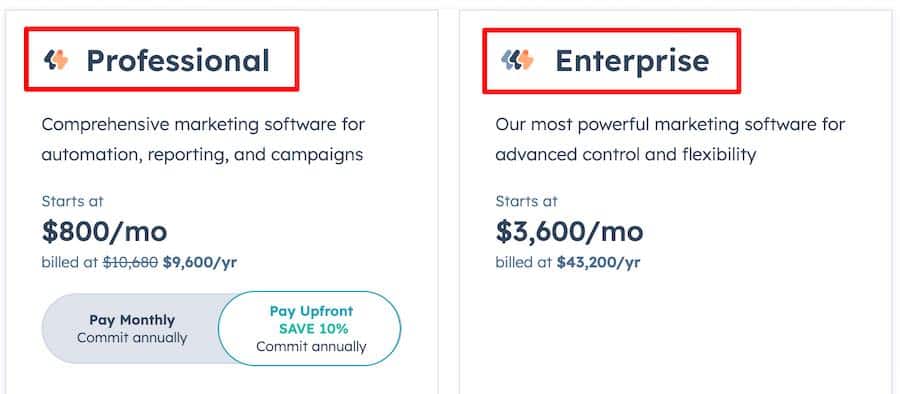
- Starter ($40/month): All features of the free plan, plus additional forms, up to 50 email list segmentations, $1k in ad management, ten reporting dashboards, and limited conversational bots.
- Professional ($800/month): All features of free and starter, plus 2,000 email list segmentations, $10k in ad management, 25 reporting dashboards, and full chatbot features. This plan offers additional features like phone support, content strategies, an SSL certificate, and a blog.
- Enterprise ($3,200/month): All features outlined above (with higher-tier options), user roles, event-based segmentation, predictive lead scoring, API calls, multi-touch revenue attribution, webhooks, and more.
What I Like/Dislike About Hubspot CRM:
Like:
- A free plan that you can upgrade at any time.
- Integrated with their sales and marketing suites, which include live chat, landing pages, email marketing, ad management, document management, and more.
- Free email marketing and list segmentation.
- A team email and conversations inbox for access to all messages in one place.
- A great form builder to capture lead information.
- Ad management tools to track ROI across paid campaigns on Google, Facebook, Instagram, LinkedIn, etc.
Dislike:
- With so many available features, deciding which ones to use can be difficult.
Product Updates:
- A more customer-centric provides customer portals, surveys, and native payment processing so you can close deals faster.
Get started with HubSpot CRM.
6. Freshworks CRM.
Smartest Sales Features.
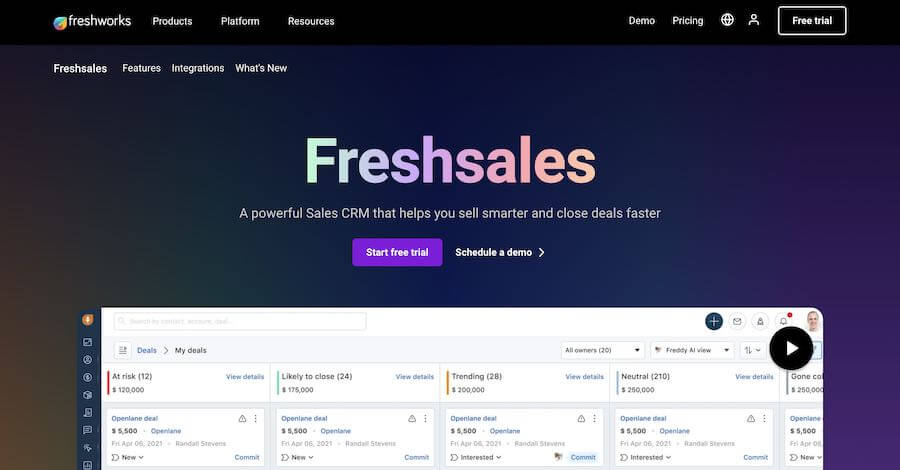
Freshworks CRM (formerly Freshsales) is an AI-based CRM for lead scoring, email activity, email capture, etc. One of its most prominent features is that it provides a 360-degree view of your business.
Key Features:
- Lead Management – Provides solutions to convert prospective leads into customers.
- Deal Management – Gives you a thorough picture of where the deal is in the sales funnel. It also helps you manage and organize every step in the funnel and maximize your chances of conversion.
- Tracking and Lead Scoring – With an in-built AI feature, you can rank and score leads and identify the ones most likely to make a purchase.
- Auto Lead Assignment – The CRM allows handpicked leads to select salespeople automatically.
- Smartforms (web-to-lead) – When a person fills up the web form on your website, they automatically become a lead and are added to your database.
User Experience:
If you want to see your whole customer journey mapped out in front of you, then Freshworks CRM is a great option.
With the ability to see every customer interaction with your company, you can quickly resolve any issues they may have.
You can also see all the various integrations that happen along the journey, making it easy to track down any problems.
Pricing Plans:

Freshworks CRM offers four plans, starting from $0 to $69 per user per month (when billed annually).
What I Like/Dislike About Freshworks CRM:
Like:
- Provides high-level automation and intelligent workflows.
- Extensive range of integrations, including MailChimp, Zapier, Calendar, Piesync, Segment, and more.
- RESTful APIs help you read, modify, add, and delete data from the help desk.
- Behavior-based lead segmentation.
- Advanced lead scoring based on characteristics and behavior.
- Sends out personalized welcome and voicemail messages.
- GDPR-compliant.
- 21-day free trial period.
- Excellent customer support via phone and email.
- Known as one of the best mobile CRMs with a mobile app.
- Event tracking (tracks previous communication to plan the future approach).
- Highly flexible.
Dislike:
- Some more features might be helpful, including salary slips, income tax proof submissions, and opportunities
- Loading times can sometimes be slow.
- It may require more frequent configuration updates than some other CRMs.
Product Updates:
- Mobile App – Shortcut Actions allow you to add contacts, deals, and notes quickly.
- Mobile App – Share Recordings allows you to share your records with your team.
- Upgraded Freshsales-Freshdesk integration so you can now view Freshdesk tickets within Freshsales.
Get started with Freshworks CRM for free.
Save by Comparing CRM Software Quotes
7. Salesmate.
Best for businesses that want to build solid relationships.
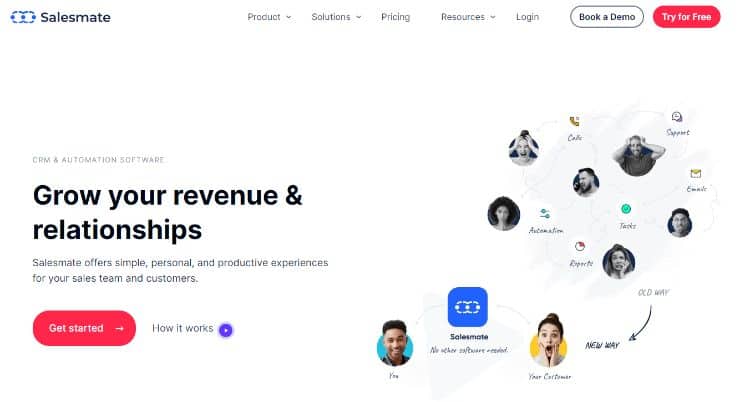
Salesmate is excellent for those that want to increase revenue and connections in their business.
Salesmate is a cloud-based sales performance customer management software that empowers your sales team and customers with simple, personal, and productive experiences.
Providing a personal touch to your prospects ensure they get the right information at the right time.
Key Features:
- Sales sequences allow you to create automated playbooks for any sales cycle stage.
- Save time, increase focus, and stay on track by having your team’s activities in one central hub.
- You can nurture leads without lifting a finger with sales automation features like email sequences, drip campaigns, and workflows.
- Using a lead assignment system makes it easy to funnel contacts to the right salespeople for quick action.
- A report library that’s easy to navigate and understand allows you to run reports on sales-related data.
User Experience:
You can create a dashboard that is customized to your needs and preferences, making it easy to see the information that is most important to you.
The interface is clean and straightforward, making it simple to find what you’re looking for.
With a focus on the visual, Salesmate makes it easy to see your sales process and progress.
Pricing Plans:
The following are the pricing plans available with Salesmate:
- Starter: $12 per user/ month
- Growth: $24 per user/ month
- Boost: $40 per user/ month
- Enterprise: Custom pricing is available
What I Like/Dislike About Salesmate:
Like:
- Salesmate, including Google Apps, Microsoft, and Zapier, support 700+ commercial app integration.
- With the best built-in calling (and SMS) in more than ninety countries worldwide, Salesmate is an excellent solution if you want to streamline your communication.
- Using their powerful dialer, you can connect to anyone within your contact list through an easy-to-use interface.
- Secure & compliant enterprise security and compliance standards (for private and sensitive data) mean that Salesmate is a safe solution for your business.
Dislike:
- Multiple hard refreshes are sometimes required to load pages correctly
- Email tracking is not as accurate as some of the other options on the market.
- A better scheduler can help you to keep track of your tasks and events.
Product Updates:
- Create banners in Chat Journeys so your representatives can quickly answer frequently asked questions.
- Customize your meeting greetings with your company logo, tagline, and colors.
- Security improvements for users mean that your data is more secure than ever.
Get started with Salesmate today.
8. Zoho CRM.
Best CRM For Small Businesses (SMBs).
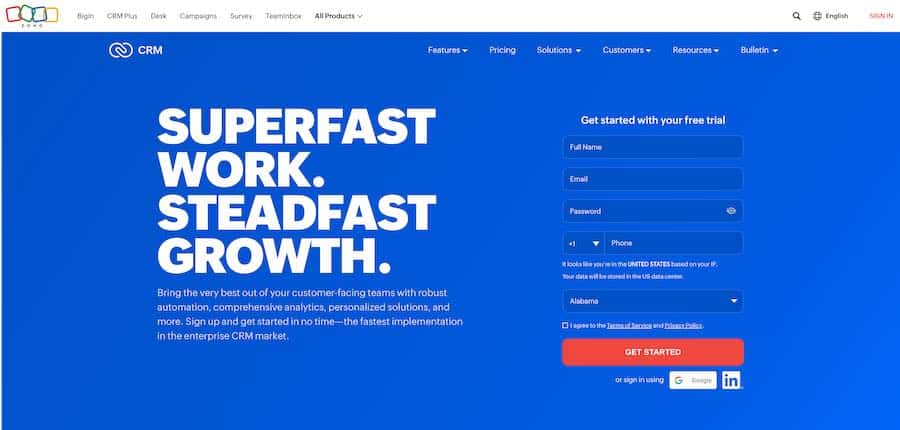
With Zoho CRM, you can get a 360-degree view of your business, track sales and marketing opportunities, and increase conversion rates.
With more than 150,000 customers globally, Zoho CRM is one of the most popular tools on this list.
Key Features:
- Advanced CRM Analytics – Integrates your data and derives actionable insights.
- AI-Powered Sales Assistant – Zoho helps sales teams and representatives make decisions based on customer profiles and detect anomalies.
- Performance Management – With features like gamification, reporting, sales forecasting, and territory management, you can make the best of your small business spending.
- Sales Enablement – Helps you generate price quotes and access sales scripts.
- Process management – Enables the team to chart every sales process step with sales builder and processing rules.
Pros:
- Omnichannel customer support via phone, live chat, email, and social media.
- Provides high-level automation.
- Highly customizable.
- More than 100 third-party integrations, including LinkedIn, Zapier, email integrations like Google and Outlook, and more.
- Highly scalable.
- 15-day free trial period.
- Offers a mobile version (for paid plans).
- Ensures data security, integrity, and regulatory compliance.
- Multi-language offered.
- Has a free plan for up to 3 users.
- Provides holistic calendar management.
- Offers data import/export.
- Predictive sales feature to help with data enrichment, email sentiment analysis, and more.
Pricing Plans:
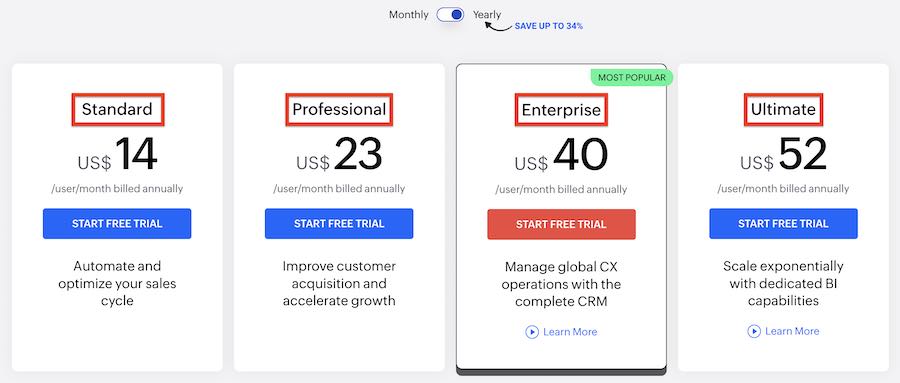
All four paid plans, the ‘Standard,’ ‘Professional,’ ‘Enterprise’, and ‘Ultimate,’ cost $14, $23, $40, and $52 per user per month (billed annually). Zoho CRM also offers a freemium plan for up to 3 users.
Get started with Zoho CRM.
9. Act!.
Best For Working Smart.
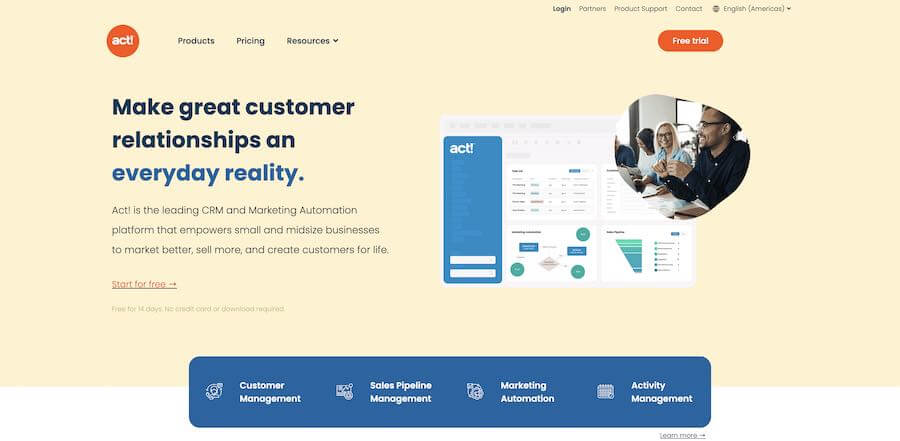
Act! provides businesses with the right metrics and insights to close more deals and manage customer relationships.
It offers various features, including contact and lead management, opportunity tracking, quotes and invoices, marketing automation, and reporting.
The software is available in both on-premise and cloud-based versions, so businesses can choose which program best suits their needs.
The pricing plans are transparent, meaning you know what you’ll pay and how much of your resources the program will use.
Key Features:
- Rich account management means businesses have all the data they need about their customers at their fingertips.
- The calendar & activity tracking feature allows businesses to see upcoming events and track their progress.
- The Dynamic sales pipeline management feature gives businesses a visual representation of their sales pipeline so they can see where each deal is at.
- Act! Insight analytics gives businesses valuable insights into their customer base to make better marketing and sales strategy decisions.
- Office, Outlook®, & Google™ integration means businesses can access their Act! account from any of their devices.
- The Act! Companion mobile app allows businesses to view their account, contacts, and calendar on the go.
Pros:
- Manage sales force automation to help you keep track of your sales team’s performance and progress.
- When it comes to marketing automation, Act! provides powerful tools to create engaging campaigns that reach a wider audience.
- Finally, its customer relationship management capabilities make it easy to manage your customer relationships and improve your business performance overall.
Pricing:
Pricing is $37.50 per user per month, billed annually when selecting the on-premises plan.
There is then various marketing automation that you can add on based on your specific needs.
Regarding the cloud-based, the pricing is either $30 per user per month (Standard plan) or $45 per user per month (Expert plan).
Get started with Act!.
10. Salesflare.
Best Sales CRM For Automation.
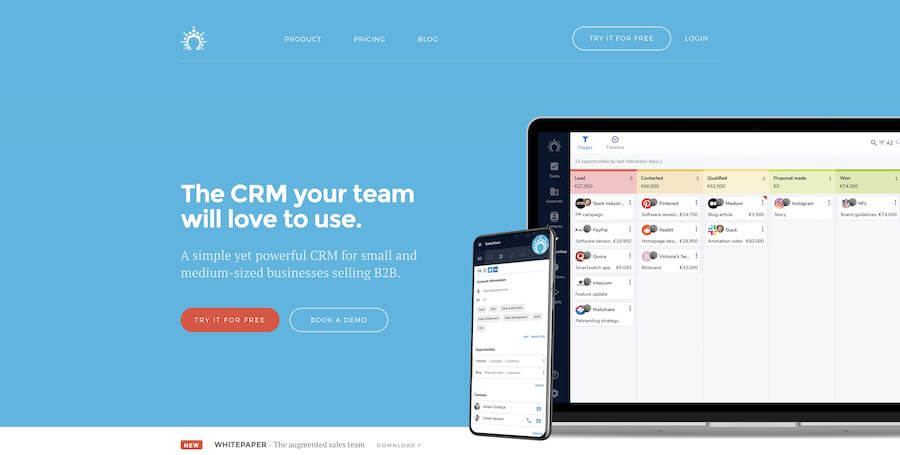
Most CRMs depend on you and the rest of the sales team performing manual data input, but this is not the case with Salesflare. It makes keeping the CRM up to date a breeze by pulling together all the information automatically.
Key Features:
- Visual, drag-and-drop sales pipelines: Create a clear overview of your pipeline, quickly update it, and track progress. You can create as many pipelines as you like.
- Email and website tracking: Know how your customers interact with your emails and what they’re reading on your website—track emails sent from Gmail, Outlook, and Salesflare.
- Email signature sync: Stop copy-pasting information from email signatures into your CRM. The tool automatically detects and interprets signatures to update your contacts.
- Automatically enriched company and contact data: Start typing the name of a company, then click the correct search result. It takes it from there by pre-filling the company profile with the available info.
- Email templates & workflows: Automate repetitive emails using templates in Salesflare and Gmail, powered by shortcut keys and merge fields. Want to automate your follow-up fully? Just set up an email workflow.
- Relationship strengths: Looking for the proper intro? Salesflare detects who in your team knows who (and how well) at the company you’re chasing, so you know how to approach them.
- Automated reminders: Never forget to follow up with a customer, answer an email, or enter meeting notes.
- Business card scanner: Snap a picture of the business cards you receive with its built-in scanner. Its AI will extract all contact details in a matter of seconds.
- Out-of-the-box dashboards: No need to hire a business intelligence person. From the moment you get going, their tool will automatically start crunching your data and extracting insights.
Pros:
- You’re up and running in days, not months: Going live takes teams three days on average, compared to almost two months with competing CRMs.
- Your team gets it: Even though it packs a lot of power, its interface is simple and intuitive. And its automation keeps your team updated and using it, even when times get rough.
- Happier customers; more sales: Teams more effectively track their prospects, so everyone gets the personal attention they deserve.
Cons:
- Doesn’t offer on-premise deployment.
- Supports only English software.
Pricing:
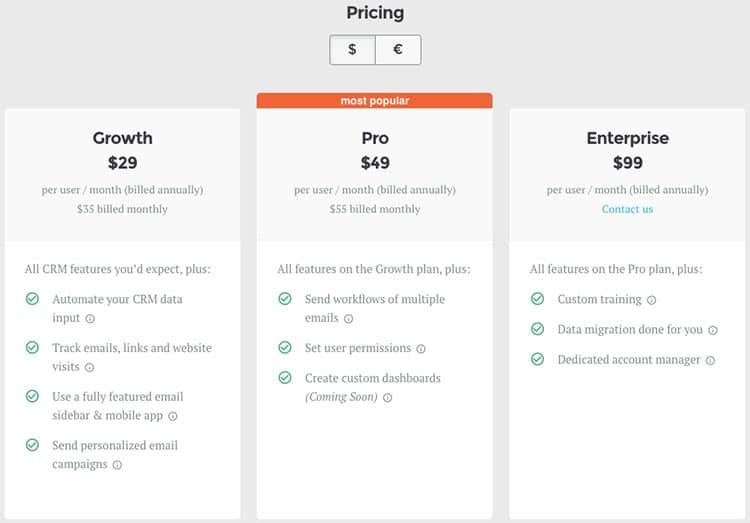
Salesflare offers three paid plans: Growth, Pro, and Enterprise.
Most features come on the Growth plan, except email sequences, permissions, and custom dashboards. The Enterprise plan is for those who need enterprise-level assistance. The prices start from $29 per month and go up to $99 per month.
11. Nimble.
Best Simple CRM.
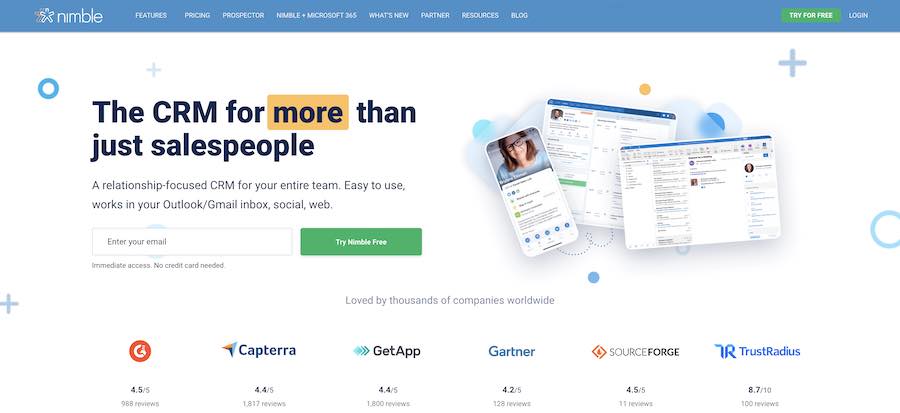
The Nimble is an excellent, albeit simple, CRM software tool that works within the G-Suite inbox or Office 365.
It allows you to easily update contacts, access company & contact insights, and manage deals from within your workflow, among other impressive features.
Key Features:
- Relationship Management – helps you automatically combine and collate social media connections, communications, inboxes, and calendar appointments.
- Live Profiles – actionable, accessible contact records to quickly locate contact information and interaction history.
- Segmentation – helps you stay organized by segmenting your contacts into lists to take various actions.
- Reminder feature – never miss out on an opportunity with pre-scheduled reminder features.
- Pipeline management – always stay on top of every sale funnel stage by the visual representation of pipelines.
Pros:
- Sends out group emails to help you engage your audience at a large scale.
- Email tracking to engage customers/leads more effectively.
- Extensive third-party integrations include Gmail, Outlook, HubSpot, Mailchimp, and more.
- Offers a redesigned smart contacts app (enhanced widget to support calendars, tasks, deals, and more).
- Highly scalable and customizable.
- 14-day free trial.
- The prospector tool allows you to visit a website and get professional details about people who aren’t listed.
- It has a ‘group message’ feature.
- Extensive task management to create and assign tasks to different team members.
- Compatible with mobile phones.
- Ensures data security, integrity, and GDPR compliance.
Cons:
- Only a single plan is available.
- Doesn’t come with the auto-responder feature.
- Doesn’t have a free plan.
- Many integrations need a ‘sync’ tool to function correctly.
Pricing Plans:
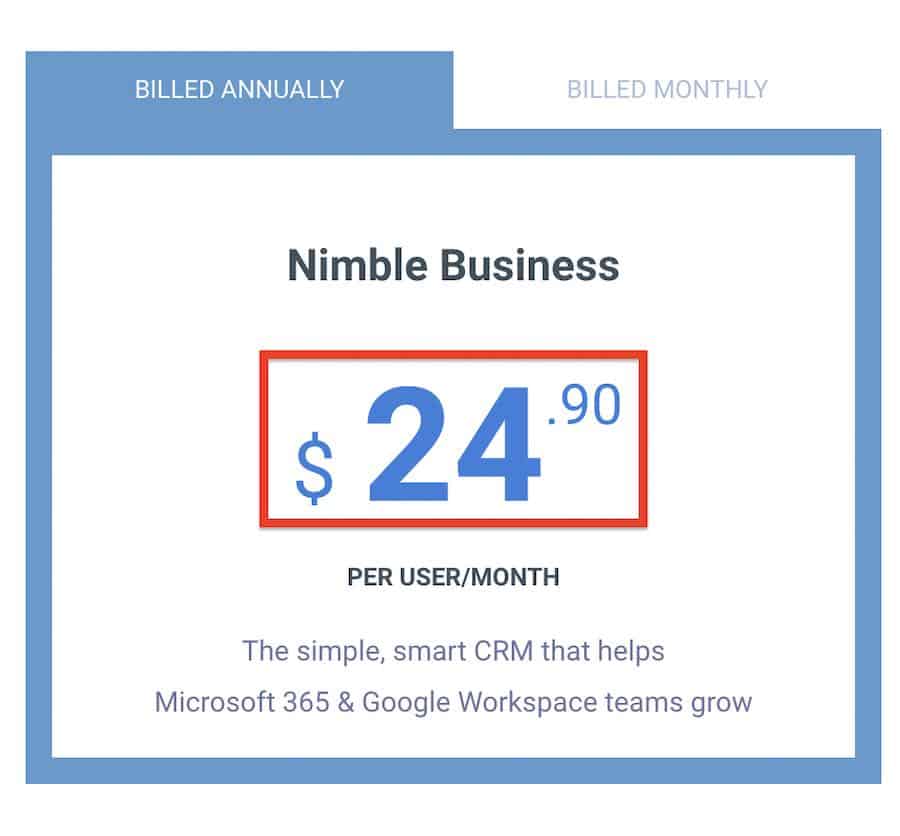
There is only one plan available. The price is $25 per month (billed monthly) and $19 per month (billed annually).
12. NetHunt CRM.
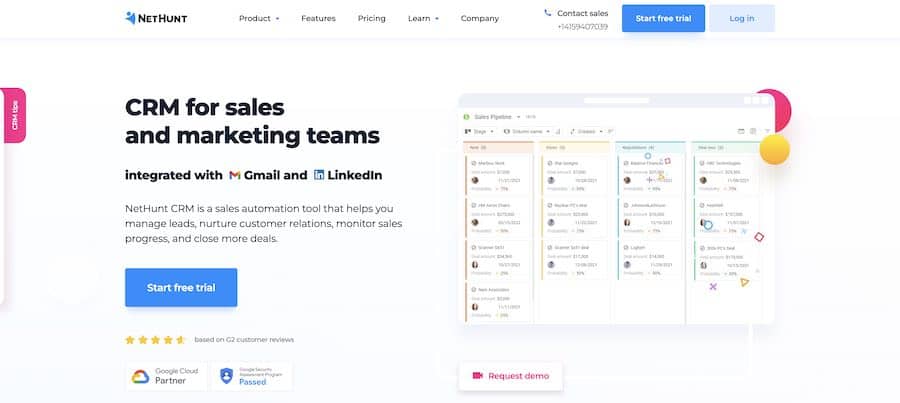
NetHunt CRM works collaboratively with your Google account and all other applications.
It brings you all the familiarity of the G-suite and all the CRM functionalities.
Key Features:
- Customer Relationship Management – Takes care of managing and following up on leads, taking care of existing customers, creating records, and answering questions.
- Pipeline Management – Picks the right deals and activities to select and follow up on a daily or weekly basis and see how close you are to closing a deal.
- Sales Cycle Management – Go after leads more effectively, find out the status of the sales cycle, and optimize efforts.
- Leads Tracking – Ensure timely follow-up and status of leads so that you can track and address them effectively.
- Sales Tracking – This helps you track sales across multiple channels, monitor the KPIs of the sales team, and capture information about leads and customers.
Pros:
- Fully integrated with Gmail.
- 14-day free trial period.
- Filter, sort, and save data the way you need.
- Highly customizable and scalable.
- Sends out personalized, bulk emails.
- Capture prospective leads in one click.
- User-friendly, intuitive interface.
- Extensively integrated with third-party applications (LinkedIn, Mailchimp, Twitter, Facebook, and more).
- Cloud-hosted (inexpensive and easy setup).
- Multi-language platform.
- Email, phone, and live chat customer support are available.
- Compatible with mobile devices.
- Data import and export are effortless.
Cons:
- It isn’t compatible with Linux.
- Ticket customer support is not available.
- On-premise deployment isn’t available.
- No free plan is available.
Pricing Plans:
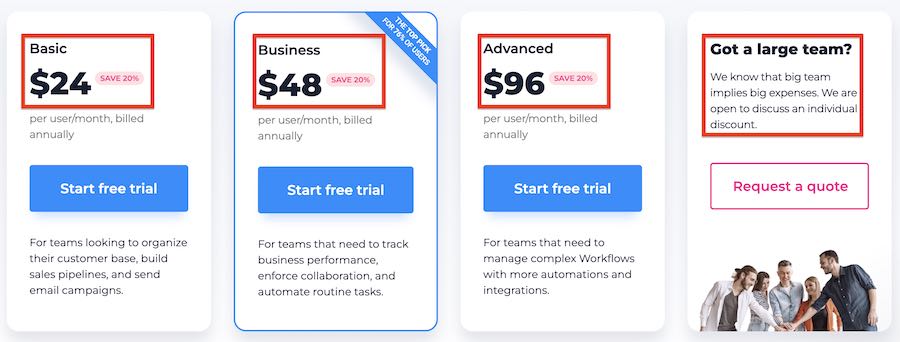
NetHunt CRM offers three plans, called the ‘Basic,’ ‘Business,’ and ‘Advanced.’ The prices start from $24 per month and go up to $96 per month.
13. Insightly.

Insightly is a modern CRM platform that can help you grow your business faster by building lasting customer relationships.
Key Features:
- Lead Routing – Tracks the most relevant lead information, including a rich activity timeline of marketing campaign sources, emails, phone calls, and meetings.
- Relationship Management – This enables you to build strong relationships with existing customers and get new customers on board.
- Extensive Third-Party Integrations – Integrated with various applications like Gmail, Mailchimp, Dropbox, Outlook, and more.
- Pipeline Management – This allows you to monitor the sales team’s performance, track sales pitch, and identify where it is precisely in the sales funnel.
Pros:
- Compatible with mobile devices, both Android and iOS.
- Provides visual dashboards for displaying and tracking essential metrics.
- Ensures data integrity (military-grade AES-256 encryption) and regulatory compliance (GDPR-compliant).
- Highly flexible calendaring and events.
- Highly scalable and customizable.
- Offers features to ensure efficient filtering and tagging possible.
- In-built automated email reminders and tracking.
- 14-day free trial.
- One of the most affordable software solutions.
- Customer support is available via phone, tickets, and email.
- In-built tutorials for hands-on experience working with the software.
- Get a real-time macro/micro view of your business.
- User-friendly and intuitive.
Cons:
- Doesn’t have live chat support and on-premise deployment.
- Supports only one language (English).
Pricing Plans:
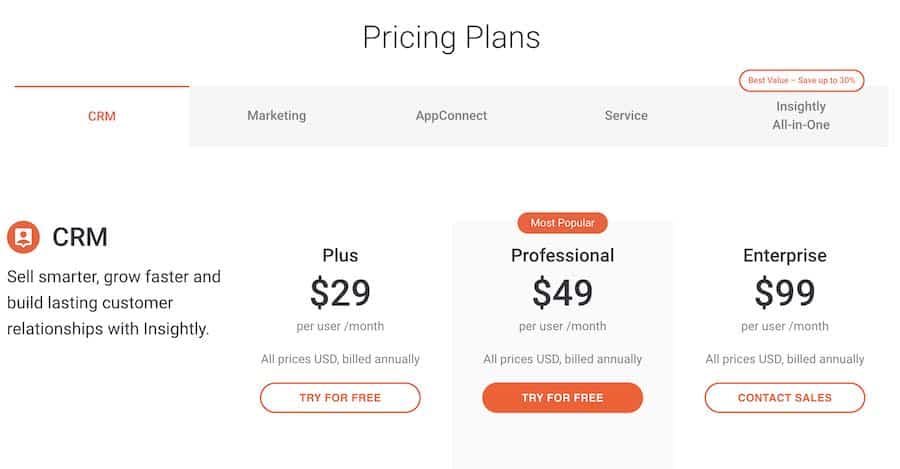
The prices start from $29 and go up to $99 per user per month (billed annually). Insightly also offers a free plan for up to 2 users.
Save by Comparing CRM Software Quotes
14. Engagebay.
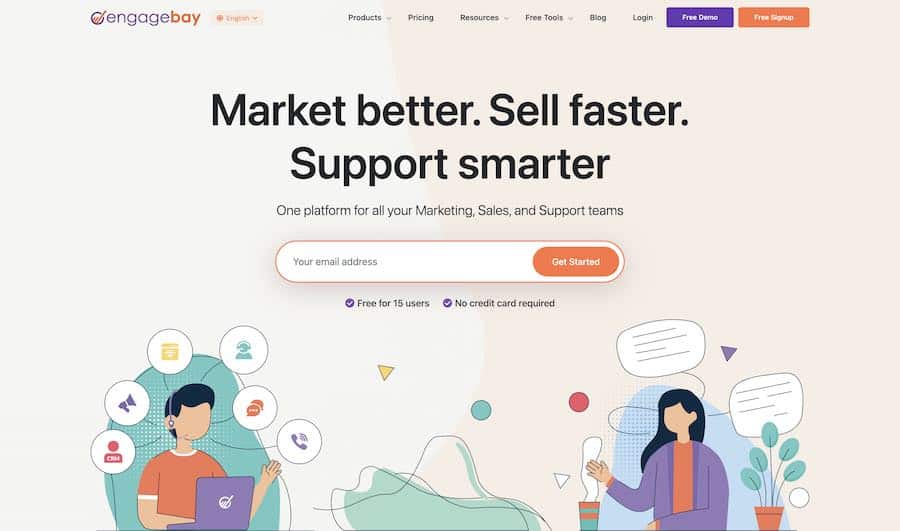
Engagebay is a cloud-hosted CRM that integrates all business processes and functions, like sales, marketing, and finances, into a single platform.
On top of that, the software primarily focuses on automation for maximum efficiency.
Key Features:
- Email Marketing – Offers a great module with features like A/B testing, auto-responders, CAN-SPAM compliance, dynamic content, event-triggered emails, and more.
- Lead Generation – Efficient lead generation with features like contact import and export, lead capture, database integration, nurturing, scoring, segmentation, and more.
- Marketing Automation – Offers customizable CTAs, drip marketing campaigns, sales intelligence, website visitor tracking, and so forth.
- Social Media Marketing – You can perform analytics, contact management, automated publishing, content management, and multi-account management.
- Content Management – Allows you to create custom content that fits the needs of your target audience.
Pros:
- Offers a great free plan.
- Extensive third-party app integrations, such as Zapier, Xero, and more.
- Highly customizable and scalable.
- User-friendly and intuitive interface.
- Comprehensive customer support via phone, live chats, email, and tickets.
- Offers free trial period for paid plans.
- One of the most affordable plans in the market (entirely cloud-based).
- Ensures data security, integrity, and regulatory compliance (GDPR-compliant).
- Real-time, consolidated customer information for all (including previous interactions and purchases).
- Variety of forms and pop-ups for visitor engagement and lead generation.
Cons:
- Doesn’t offer on-premise deployment.
- Supports only English software.
Pricing Plans:
It has four broad segments:
- All-in-one
- Marketing
- CRM & sales bay
- Service Bay
The CRM & sales bay segment has four plans (one free and three paid).
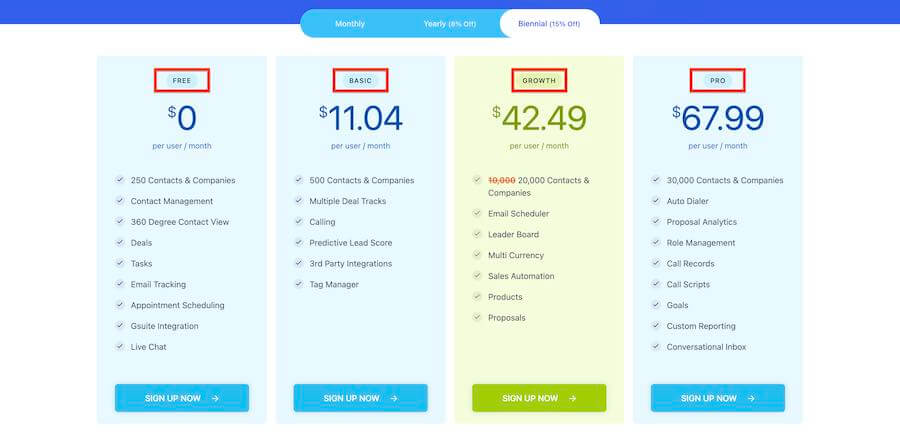
The paid plans start from $11.04 and range up to $67.99 per user per month, based on features (when paid bi-annually). You can also pay annually or monthly.
15. PipelineDeals.
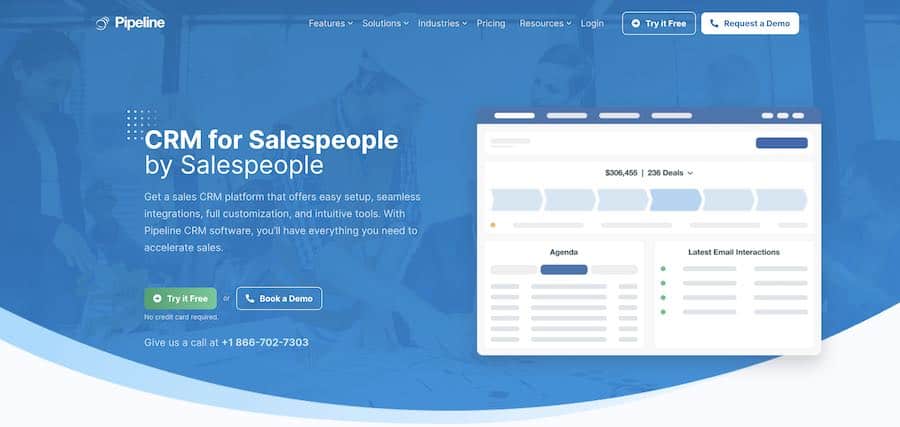
PipelineDeals is an intuitive, cloud-hosted, all-in-one CRM software ideal for small and medium businesses.
It has excellent features with a focus on sales and employee empowerment.
Key Features:
- Sales Pipeline Management – This feature allows you to visualize, optimize, and understand your sales pipeline for maximum efficiency.
- Lead Management – Identify, track, follow up, and nudge the leads that are most likely to be converted (into sales) along the sales funnel.
- Contact Management – Helps you build new relationships with prospective leads and follow up on existing customers.
- Sales Team Management – Sets meaningful objectives and establishes team activity tracking. Moreover, it helps you eliminate redundancies, delays, and confusion by organizing team knowledge and providing a framework for collaboration.
- Automation – Automate mundane and repetitive tasks so your team can focus on more important things.
Pros:
- 14-day free trial period.
- Unlimited deals, stages, companies, and contacts.
- Unlimited file storage.
- Accessible import/export data (Excel or other CRM).
- Since it is cloud-hosted, it’s inexpensive and easy to set up.
- High customizability and scalability.
- Compatible with mobiles (Android and iOS).
- In-built email acceleration helps track open rates, click-through rates, and downloads.
- It enables you to develop dashboards for real-time visualization.
- Extensive third-party integrations (Mailchimp, Outlook, Excel, Zapier, and more).
- In-built foreign currency tracking (any market or local currency).
- Comprehensive data analytics and campaign management for actionable insights.
- Extensive customer support via email, phone, live support, and tickets.
Cons:
- Doesn’t offer a freemium plan.
- You don’t get an on-premise deployment.
- No multi-language support (only English).
Pricing Plan:
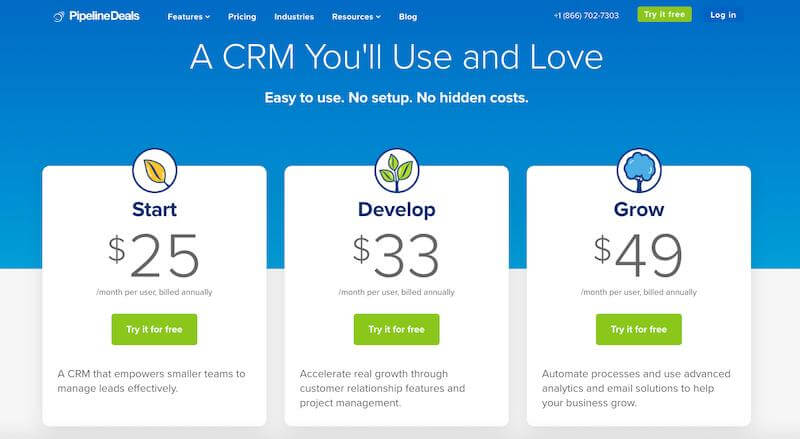
The paid plans start from $25 to $49 per month.
16. Agile CRM.
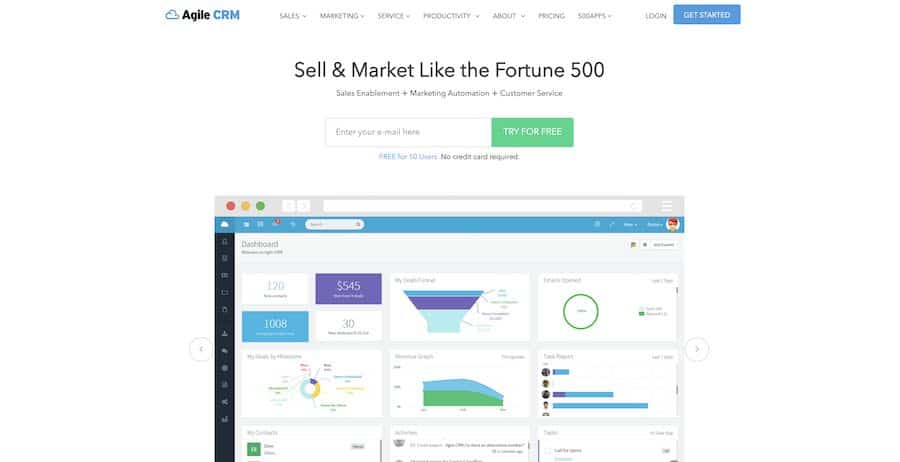
Agile CRM is an all-in-one CRM focused on automating your marketing and sales while pooling them onto one platform.
It is a cloud-based SaaS service and one of the most affordable software.
Key Features:
- Contact Management – Efficient single-page management of contacts can help you close more deals.
- Project Management – Effective management of all projects on the same platform with features like drag-and-drop task lists and more.
- Appointment Scheduling – You can share your calendar online & automate scheduling, invites, and follow-ups.
- Email Marketing – Create and send professional emails and newsletters, personalize them, and track & analyze results.
- Lead Management – Track & monitor leads more effectively. Keep track of their contact details, activities, and interactions with your sales team in one place.
Pros:
- It offers a free plan for up to 10 users.
- Cloud-based (inexpensive and easy to set up).
- Offers multi-chat windows, easy data entry, and workflow automation.
- Extensive customer support via phone, email, live chats, and tickets.
- Comprehensive email tracking to help you gain essential insights into your email marketing campaign.
- Built-in auto-responders.
- Extensive third-party integrations with social, billing, email, and customer support apps.
- The “telephony” feature lets you enjoy one-click calling, call scripts, and voicemail automation.
- Offers mobile marketing to send out personalized SMS and use mobile messaging in campaigns.
- It helps you create dynamic landing pages to attract and engage potential leads.
- Offers excellent exit intent pop-ups (convert abandoning visitors using them).
- Highly scalable, customizable, and user-friendly.
Cons:
- Doesn’t provide on-premise deployment.
- Supports only English.
- 24/5 customer support (not 24/7).
Pricing Plans:
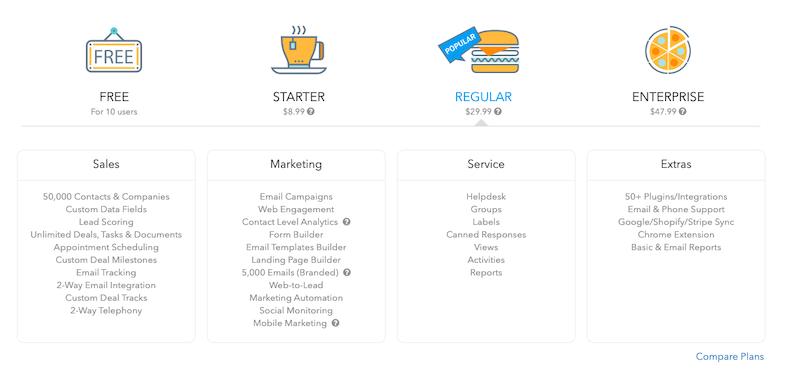
Agile CRM is a free plan with limited features. There are three paid plans starting from $8.99 and ranging up to $47.99 per user per month.
17. Adsoup.
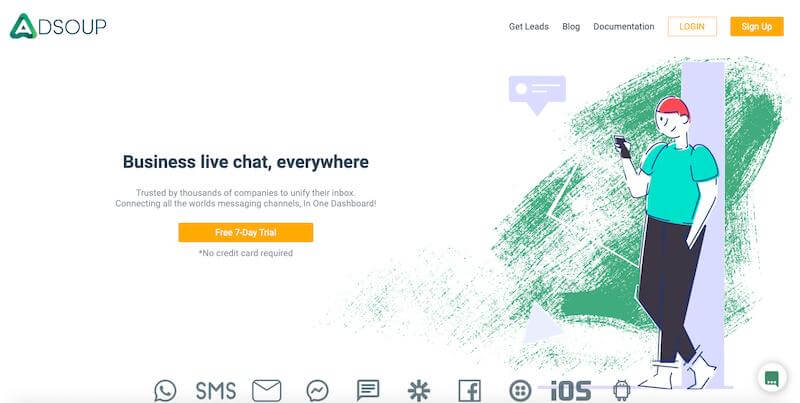
Adsoup is a multi-platform CRM software focused on streamlining communications between your business and clients.
It is most suitable for sales and useful for small and medium-sized enterprises.
Key Features:
- Real-time Messaging – Mobile compatibility ensures that you can always serve your customers, even from remote locations, by using a web browser.
- Sales Tracking – Know the exact status of a prospective lead and its position in the sales funnel.
- Revenue Monitoring – Study and keep track of the channels generating the maximum revenue for increased focus.
- Single-platform communications – Allows sales representatives to keep track of all prospective leads across multiple windows and not miss out.
- Data Insights – Get a deep dive into the customer base and build strategies for better efficiency.
Pros:
- Has a great free plan.
- Paid subscriptions have a 7-day free trial.
- High level of automation (collect Facebook lead generation, messaging ad responses, and email leads into a pipeline).
- Provides shared IMAP email and Google Dialogflow bot (paid plans).
- Compatible with mobile devices.
- Perform simultaneous chats.
- Contains a canned responses feature (added efficiency).
- Real-time value tracking and revenue reports.
- Cloud-hosted (inexpensive and easy setup).
- Customer support via live chat.
- Offers a single dashboard to unify multiple channels.
- Involves document storage and an easy platform switch.
- Offers drag-and-drop deal management.
- Extensive third-party integrations.
Cons:
- Doesn’t have email/phone customer support.
- Supports only English (no multi-language capacity).
- You have to pay an additional amount for extra add-ons.
Pricing Plans:
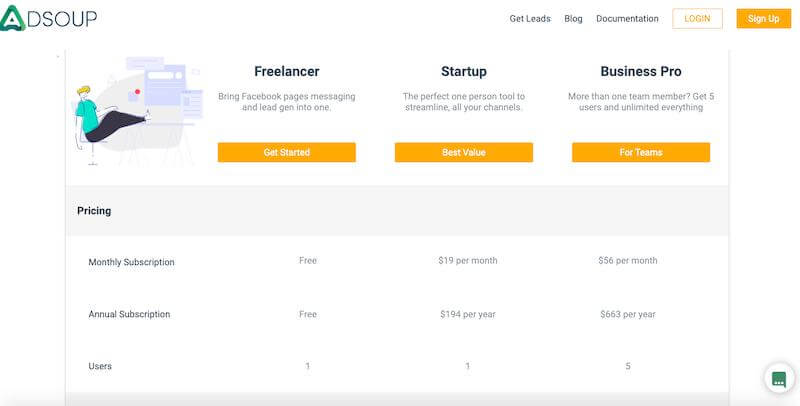
For one, Adsoup offers an effective free plan.
The paid subscriptions start from $19 and go up to $56 per user per month (billed monthly).
The annual payment involves a discount.
Some tools not yet listed include SugarCRM, Netsuite, SAP, and Microsoft Dynamics CRM.
Save by Comparing CRM Software Quotes
What Should You Look For in CRM Software?
Here are the top 10 things to look for when choosing your web-based CRM software:
1. Sales and Lead Management.
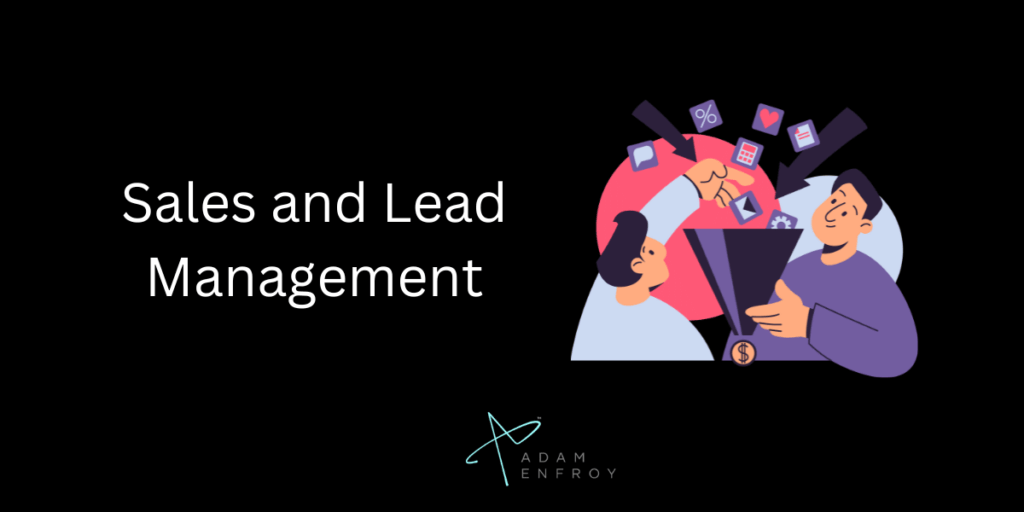
Your CRM should generate leads from inbound marketing, sales calls, email sign-ups, and more. Look for preset tasks to follow up with leads in less time.
Your CRM should nurture your leads through the entire sales pipeline, from lead to close.
2. Marketing.
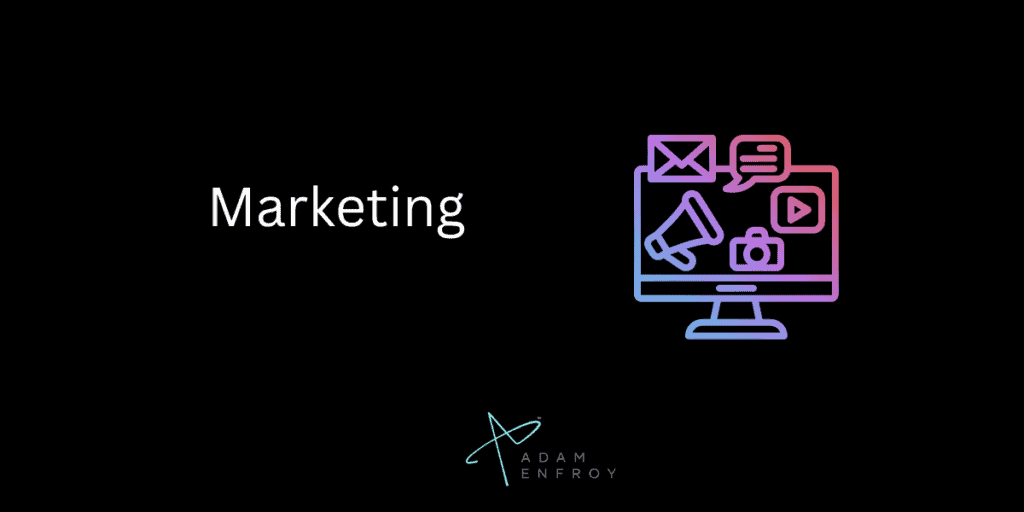
Built-in marketing tools like email pipelines, databases, and social media integrations can help with marketing and sales alignment.
3. Integrations.
CRM systems integrate with other essential business software like email marketing, advertising platforms, data visualization tools, and more.
4. Analytics and Reporting.

Most CRM platforms have built-in reporting capabilities and pre-designed reports.
Check for live and dynamic reporting features.
5. Product Mobility.
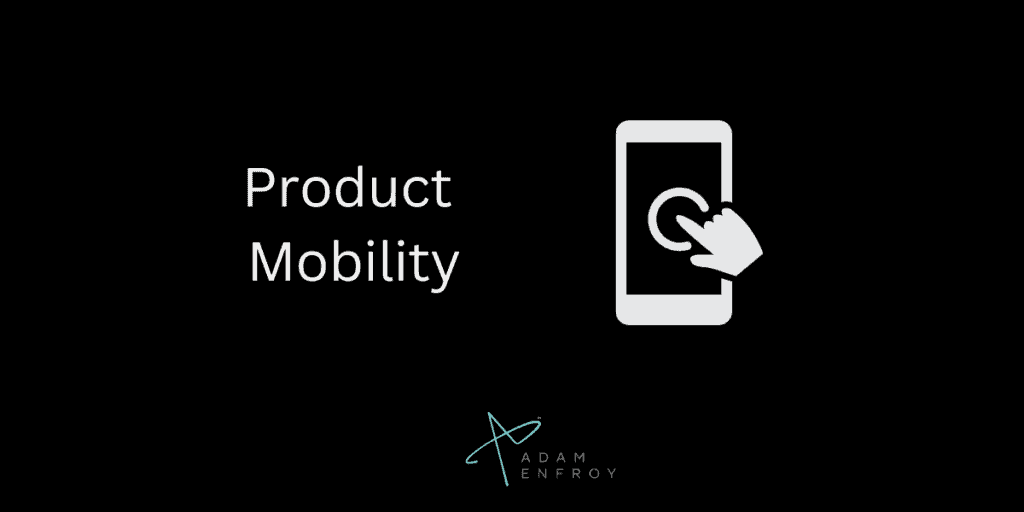
Since sales teams are on the move, does the CRM offer usage across different devices?
Check if you can use the CRM on computers, mobile devices, and tablets.
6. Implementation Timeline.
The product implementation period should be relatively quick, low-cost, and error-free.
Ask your support engineer how long the timeline is and what resources are required from your team.
7. Project Management Workflows.
Task management boards and approval checklists should help your sales teams manage their tasks efficiently.
8. Security.

File storage and platform security are paramount when selecting your CRM.
Since your CRM is integrated with so much important data, ensure your platform’s security is top-notch.
9. User Experience is Key.
How easy-to-use is your CRM? Don’t forget UX, and make sure that your team is comfortable working with this tool for the long haul, as there is a short learning curve.
10. API Calls.
Your CRM should have a robust, extensible, and open architecture for custom data integrations.
Questions to Ask When Choosing CRM Software.
- Is this built for small businesses or enterprises?
- Does this software integrate with the tools I’m already using?
- How many user seats are provided, and are there user minimums?
- Would it be easy to train employees?
- Are there set-up fees, and what is the total cost?
- What type of security features is standard in the software?
- Is the API accessible?
What Are the Benefits of CRM Software?
Here are some of the demonstrated benefits of using a good CRM for businesses of all sizes:
1. Improved Client Relationships and Customer Interactions.
CRM software allows you to streamline customer information and can help you generate insights, allowing you to serve your clients better.
2. You Can Cross-Sell And Up-Sell.
Armed with a knowledge base about customer choice and preferences, you can easily suggest purchasing complementary products.
On top of that, you can recommend other value-added versions of the product(s) that are pricier than the one your customer has bought.
3. Improves Collaboration.
Breaking away from silos, every organization member can access the same data in real-time, leading to enhanced collaboration between team members and the other sales and marketing teams involved.
While most people think of CRM for marketing or closing software for sales, collaborative CRM is about using customer relationship management software across various departments to improve customer relationships.
4. Enhanced Efficiency.
Since you are privy to customer preference, choice, and purchase history, the client doesn’t need to explain their requirements.
You can capitalize on your knowledge, satisfy the customer, and enhance work efficiency.
5. Save Costs In The Long Run.
Setting up CRM software can be costly, but it is a one-time cost.
On the other hand, enhanced operational efficiency and collaboration lead to increased productivity, which lowers in the long run.
6. Increases Employee Engagement.
Employees feel empowered when they can access data, resulting in employees taking more ownership of the day-to-day work.
Thus, CRM solutions naturally increase employee involvement.
How Do You Use CRM Software?
It is easy to start using CRM software, especially when you think about the benefits associated with it.
For best results, you need to use it across all levels of your organization.
Here are some steps on how to use a CRM:
1. Add Sales Representatives.
Before adding anyone else, ensure you get your salespeople on board since they’re most vital for your CRM tool.
Your sales team will ultimately rake in the revenue, and CRM is crucial to get more sales for the business. You also need to ensure they find it easy to use.
2. Segment Your Audience.
Every business is different, and there are different ways a company can segment its sales funnel.
The most commonly used method is dividing your potential customers into stages like ‘lead,’ ‘opportunity,’ and ‘customer,’ representing them from a company standpoint.
3. Import Your Contact List.
While many small businesses use different CRM systems for various uses, using a single one is a good practice.
However, whether or not you’re using a single CRM, you’ve got to import your data, like the contact list, past deals, and other customer information.
Almost all of the CRM systems tools allow CSV file uploads.
4. Third-Party Integrations.

The whole point of a CRM is to focus on the customer details and data through as many channels as possible.
Therefore, you need CRM software that provides abundant third-party integrations.
Some essential integrations you should look at are Amazon, Alibaba, Facebook, Twitter, and Instagram, among others.
5. Create a Dashboard.
CRM systems can simplify things for you by creating a dashboard.
A dashboard lets you take control of everything you need to do by displaying it on the screen.
It’s a visual, central control panel where you can access all your business functions and control anything you want at any time.
Here’s an infographic that depicts what a typical CRM systems dashboard looks like:
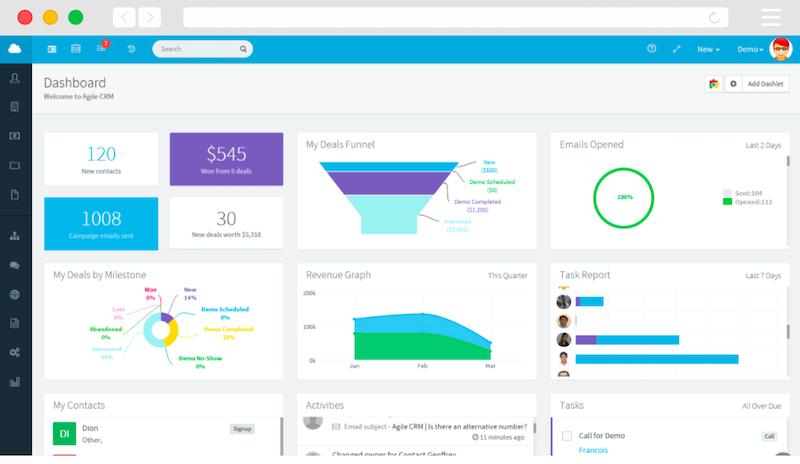
You can see and monitor project updates, task completions, statistics, visualizations, charts, and much more.
6. Create Reports.
The sales team is where your marketing efforts hit real-world sales.
That’s why you should provide them with as much information as possible, which will ease their job of selling the right value to the right customers.
It’s a good practice to create reports at regular intervals, like weekly, quarterly, or monthly, and send them to the sales reps.
These reports help the sales reps to:
- Evaluate their performance
- Evaluate the performance of the team
- Keep track of the targets they have achieved and the goals they’re yet to achieve
- Keep track of the comparative performance between colleagues (for bonus and incentive considerations)
The sales reps can then modify their performance accordingly.
Top Ways A CRM Improves Customer Relationships
Here are some of the ways a good CRM (Customer Relationship Management) platform can help improve customer relationships:
- Automated responses: A CRM system automates most of the customer service process, saving you time and energy to focus on more critical tasks. This automation includes responding quickly to customer inquiries with automated messages tailored to their needs.
- Data integration: With a CRM, your team can access all customer data in one place and easily segment customers into different groups based on information such as purchase history or current location.
- Improved communication: A CRM system streamlines team communication so everyone is always on the same page.
- Lead generation: A CRM can help identify potential leads by analyzing customer data and monitoring their activities for real-time insights into their needs and behavior.
- Enhanced analytics: With a CRM system, you can collect and analyze real-time customer data to better understand their buying habits and preferences.
These are just a few ways a good CRM platform can help improve customer relationships and drive growth for your business.
Best Practices for Managing Data in a CRM System
The best practices for managing data in CRM systems have been well-established and refined over time.
One of the critical factors to successful data management in CRMs is proper organization.
Data should be organized into logical groupings, such as customers, contacts, products, orders, etc., so it is easy to find and access when needed.
This will also make it easier to determine where changes need to be made or which areas may require additional attention and resources.
In addition to organization, regular data maintenance should be done regularly to ensure accuracy and reliability.
This includes verifying contact information or updating customer accounts with new purchases or activity history.
It also pays to consistently audit the system for any potential issues or discrepancies that may need attention.
Doing this regularly can help prevent errors that could cost both time and money trying to fix them down the road.
Data integrity is another critical factor in proper CRM data management.
For proper data entry and accurate information stored within the system, specific processes need to be followed.
For example, inputting customer details into a CRM must follow strict guidelines set forth by the company’s internal policies to be accurate and complete upon submission.
Ensuring all fields are updated accurately at each step along the way is essential for accurate reporting later down the line.
It also helps track individual customer interactions throughout their journey with your business.
Security should also be considered when managing data within a CRM system, especially if that system stores sensitive personal information such as payment methods or addresses.
Establishing appropriate user permissions levels can help protect your company’s assets from unauthorized access while allowing those who need access to get the job done correctly without compromising.
Encrypting sensitive fields can also provide added security without sacrificing the usability or functionality of the system itself.
Finally, training staff on the proper use of the CRM is essential for ensuring everyone knows how best to use and manage data within it, so nothing gets lost or overlooked through human error alone.
CRM Software FAQ
There are plenty of options if you’re looking for a simple and easy-to-use CRM. The free version of HubSpot that syncs with your Gmail account is straightforward to set up and use. NetHunt, another Gmail-based CRM, can be installed with just a few clicks. Finally, Nimble CRM is known as a user-friendly CRM and is quick and easy to set up.
Implementing and using a CRM is not as difficult as one would think. All CRMs have helpful onboarding support and technicians to get your system up and running and synced with your tech stack.
If you’re looking for a highly-customizable solution, Microsoft Dynamics, Oracle, SAP, and Salesforce all provide excellent implementation support.
Google does not have its own CRM. However, there are a lot of CRM systems that integrate with Gmail.
For example, Zoho, Agile CRM, Streak, HubSpot, Freshworks CRM, and Salesforce Essentials all easily integrate with your Gmail account.
According to HubSpot, they will keep their basic CRM free forever and will always have a free plan. Their free CRM tools include contact management, tasks and activities, contact website activity, company insights, prospects, ticketing, and more.
The best sales CRM software should have tools built for sales teams, including sales pipelines, customer and lead information, automatic follow-ups, cross-sells, upsells, and more. Here are my top picks:
1. HubSpot
2. Zoho
3. Freshsales
4. Salesforce
5. Nimble
6. Pipedrive
7. NetHunt CRM
8. Nutshell CRM
Executive Summary.
There are a lot of CRM tools on the market, and all of them have unique features and benefits.
Overall, I recommend you get started with Pipedrive or Freshworks CRM for your customer relationship management CRM software, as they are the best options.
However, you know your business better than anyone, and it’s for you to decide what it needs.
Look at the value you’re getting at a definite price point and the outcome you’re looking at.
Look at cloud vs. on-premise deployment, features and functionality, third-party integrations, ease of use, pricing plans, and more. Study all the facets before choosing the perfect CRM software for your business.
Which CRM software are you planning to use for your business?
Let me know in the comments below.
Further reading on AdamEnfroy.com: Want your CRM to do more? Check out this post on the top AI CRMs for information.
Check out these membership site platforms if you’re looking to easily monetize your expertise.
Last Updated on October 15, 2024 by Adam Enfroy
